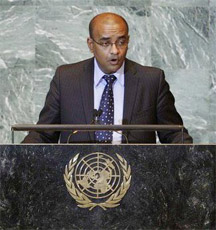In what he told the UN General Assembly was his final address to it, President Bharrat Jagdeo on Wednesday threw out four security challenges which he said must be addressed.
The challenge of food security he told the New York forum was one of these. “We are heading for 8 billion people, then 9 billion people.
Rising prosperity means that these people want greater amounts of, and more nutritious, food. On current trends, we need 100 million hectares of new land by 2020 to meet this demand. How do we do this and avoid excessive price increases and volatility?”

Energy security was another. He said as the world gets richer, the demand for energy increases massively. “We are likely to demand 36% more energy by 2035. How do we generate the energy needed to meet this demand in a way that helps people everywhere to develop, and does not choke off economic growth through high prices caused by energy scarcity?”
Resource security was also cited by the President. He said if poverty is to be relieved countries need to develop and they need minerals and other commodities.
“China on its own is accounting for over a third of the demand for many of the most important global commodities, and countries across the world – most notably in South America and Africa – can supply them. How do we help global development by sourcing these minerals and using them efficiently and justly?”
The fourth challenge was climate security which Jagdeo has played a prominent role in on the global stage. “If we are to avert the biggest economic and social catastrophe ever seen, we have to stabilize our planet’s climate. At the absolute limit, this means stabilizing global temperatures at a maximum of 2 degrees above pre-industrial levels. Yet we are on track towards perhaps a 4 or 5 degree rise according to the United Nations Environment Programme. The disaster that this could represent is beyond anyone’s comprehension. And the fact that we are not treating it as the emergency it is will be viewed by history as the biggest derogation of responsibility by societies and governments to ever take place. How can we rapidly change this situation before we run out of time?”
As part of his push for the Low Carbon Development Strategy here the President has been on a global campaign to fight climate change and has been recognized for this. He has also been at the forefront of trying to monetize the value of Guyana’s forests in fighting climate change.
Jagdeo argued that the world needed to move beyond the “global insanity that is our response to climate security. Existing pledges on greenhouse gas emissions under the Copenhagen Accord will not contain global temperature rises within limits that will avert catastrophic climate change, and some states will face extinction. Moreover, the anaemic delivery on financial pledges made at Copenhagen, and formalized in the Cancun Agreements, is leading to a disastrous break down in trust between the developed and developing world. And the prospects for reaching an international legally binding agreement on climate change at COP 17 in Durban, South Africa, would appear rather bleak. There is therefore an urgent need for high order political leadership – I feel so strongly that this is what it needs – to re-energise the climate change process and deliver credible results.”
Earlier in his address, the President said “This is the last time that I will address this great chamber as the President of my country. Before the end of this year, I will be proud to be the first President of Guyana to demit office under the constitutional term limits I signed into law in the early days of my presidency.”





